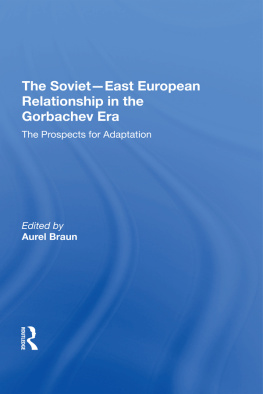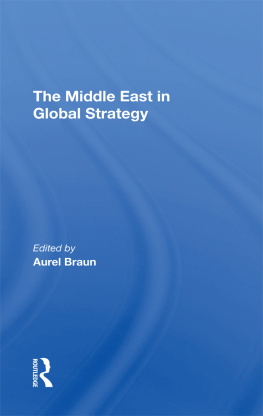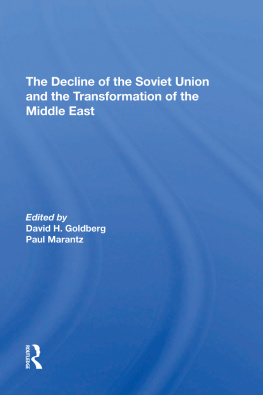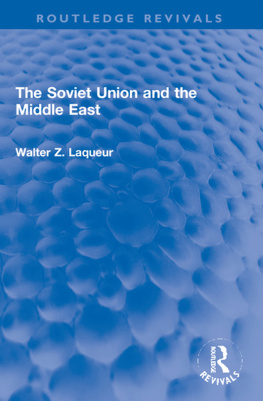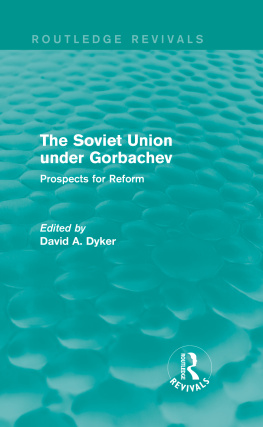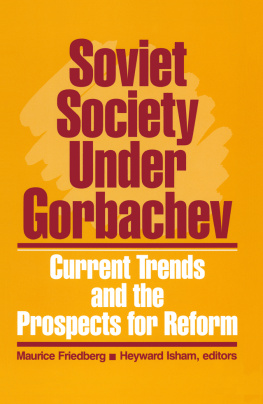The Soviet-East European Relationship in the Gorbachev Era
First published 1990 by Westview Press
Published 2019 by Routledge
52 Vanderbilt Avenue, New York, NY 10017
2 Park Square, Milton Park, Abingdon, Oxon OX14 4RN
Routledge is an imprint of the Taylor & Francis Group, an informa business
Copyright 1990 Taylor & Francis
All rights reserved. No part of this book may be reprinted or reproduced or utilised in any form or by any electronic, mechanical, or other means, now known or hereafter invented, including photocopying and recording, or in any information storage or retrieval system, without permission in writing from the publishers.
Notice:
Product or corporate names may be trademarks or registered trademarks, and are used only for identification and explanation without intent to infringe.
Library of Congress Cataloging-in-Publication Data
The Soviet-East European relationship in the Gorbachev era: the
prospects for adaptation / edited by Aurel Braun.
p. cm. (Westview special studies on the Soviet Union and
Eastern Europe)
Includes bibliographical references.
1. Europe, EasternRelationsSoviet Union. 2. Soviet Union
RelationsEurope, Eastern. 3. Soviet UnionForeign
relations1985 I. Braun, Aurel. II. Series.
DJK45.S65S662 1990
327.47dc20
89-29014
CIP
ISBN 13: 978-0-367-29619-3 (hbk)
To Julianna, David, and Daniel
Contents
, Aurel Braun
PART ONE
SOVIET PERSPECTIVES
, Karen Dawisha
, Carl H. McMillan
, Edward N. Luttwak
PART TWO
EAST EUROPEAN CONCERNS
, Andrzej Korbonski
Paul Marer
, Ivan Volgyes
, Melvin Croan
PART THREE
DILEMMAS AND PROSPECTS
, Aurel Braun
, Aurel Braun
Guide
Shortly after he came to power, Mikhail Gorbachev declared that close ties with Eastern Europe would be his first commandment. Although it is doubtful that he was suggesting a reorientation of Soviet foreign policy whereby the relationship with the East European states would occupy the center of Moscows foreign policy concerns, he signalled that he recognized the need for change in that very important relationship. For just as Gorbachev apparently understands that the Soviet Union must modernize domestically in order to be able to ensure both the regimes survival and the position of the state as a superpower in the international system, so it seems he has concluded that Moscow must adapt its external relations to changing conditions.
Given that Gorbachev has been in power for less than five years, it may be too early to judge precisely the nature of changes in the Soviet-East European relationship, but one may be able to identify certain trends or at least tendencies. The contributors assess not only the nature of the relationship but also the possibilities for more organic linkages between Eastern Europe and the Soviet Union. There has been a diminution in the exercise of Soviet petty dominance over Eastern Europe, but are current changes more form than substance? Ultimately, how well are the parties adapting to changing conditions?
Beyond the actual policies pursued by the various states, the perception that they have of the relationship is particularly significant. Consequently, the analyses in the book involve an examination not only of policies but also of perceptions in a multidimensional approach. Thus, it is important that a broad range of expertise is brought to the issues. Four key areas are at the center of this study: political/ideological, economic, military, and sociocultural. And since the perceptions of the various parties play a vital role in the relationship, a double-entry system is employed that allows experts on Soviet policy on the one hand and those on Eastern Europe on the other to examine the same issues and thereby collectively provide a 360-degree analysis. In the concluding chapter the editor brings the various approaches together and examines trends and tendencies in Soviet-East European relations.
Aurei Braun
University of Toronto
June 1989
Collective works depend not only on scholarship but also on cooperation, management, and logistics. This book has greatly benefited thus not only from the wide-ranging expertise of the contributors but also from their readiness to cooperate, their willingness to make prompt revisions, and their patience in bringing this work together.
Many individuals have given us advice and comment on this work. I would like to thank Vernon Aspaturian, Morris Bornstein, Timothy Colton, Walter Connor, Richard Day, Mary Ellen Fischer, Charles Gati, Trond Gilberg, Marshall Goldman, Bennett Kovrig, Michael Mandelbaum, Robin Remington, Radoslav Selucky, H. Gordon Skilling, Joseph Skvorecky, and Jiri Valenta, who have all helped make this work more sharply focused and relevant. Of course I assume responsibility for errors and omissions.
Generous financial help has been provided for this project by the Centre for Russian and East European Studies at the University of Toronto and the Social Sciences and Humanities Research Council of Canada.
Several individuals have provided vital help in the preparation of this manuscript. I am especially grateful to Susan McEachern, a senior acquisitions editor at Westview Press, for her encouragement, suggestions, and patience. William Guest, Jr., Douglas Alderson, Jana Oldfield, and Joe Lim at University of Toronto have ably assisted us. And I would like to thank Brenda Samuels of Erindale College, University of Toronto, in particular for her patience and persistence in the preparation of several drafts of the manuscript. Her technical expertise and calm under the pressure of deadlines were most welcome.
My wife and children not only provided me with encouragement but graciously coped with a great deal of disruption.
A. B.
Aurel Braun
Mikhail Gorbachev, at the time of this writing, has been in power a little longer than four years. This is certainly not long in comparison with some of his predecessors such as Stalin, Brezhnev or even Nikita Khrushchev. Such brevity, of course, does affect reasonable expectations of change, policy formulation, and implementation. Nevertheless, it is also noteworthy that Gorbachev has been in power somewhat longer than the combined rule of his two immediate predecessors, Yuri Andropov and Konstantin Chernenko. And, despite obvious differences in political systems, it is also worth remembering that Gorbachev has also exceeded in time the period during which John F. Kennedy held the presidency of the United States. Therefore, even in the case of a system that may be as difficult to change as the Soviet one, a period of over four years does afford opportunities for considerable movement. But perhaps even more important than the time factor is Gorbachevs often-declared intention to bring about radicar reforms. If there is to be change at a certain stage, the shape of the process should become discernable. And, if it is not, then this may raise basic questions both regarding the analytic tools and the nature of the process.
There are intrinsic uncertainties in the analysis of any process of change, but there are particular difficulties in the case of the socialist systems. Different statistical and accounting systems and the frequent unavailability of data are only some of the impediments. These are not insurmountable but they do make the identification of trends and the prospects for prediction more difficult. In evaluating reform, whether it is within the Soviet Union itself or in the relationship between Moscow and the Hast European states (the focus of this work involves the six East European Council for Mutual Economic Assistance (CMEA) member statesthe German Democratic Republic, Poland, Czechoslovakia, Hungary, Romania and Bulgaria) there are conceptual problems relating to reform and to crisis. There is also the difficulty of assessing the role of a single individual, in this case the General Secretary of the Communist Party of the Soviet Union in bringing about change in the Soviet system and in the relationship with Eastern Europe. It is not merely the problem of the single actor model that is evident in all political systems but also the specific conundrum of discerning the balance in roles that exists in socialism between the roles played by the individual leader and the system. Furthermore, there may be differences between the roles played by individual states and the manner in which a regional system operates. The paramount concern of this study is the nature of change in the interstate system in the Soviet bloc, focused on the Soviet-East European relationship. Yet this cannot be assessed without an examination of Gorbachevs policies and the nature of the changes he has proposed and so far has implemented.

